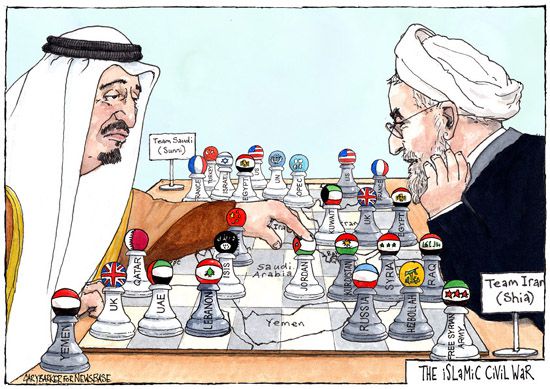
Lev Nikolajevitch Tolstoy
In the past, the stable political and civil situation of the Saudi society was a mirror of the deal between the powerful clergy and the royal family. The royalty would give its support for the not so tolerant Wahabi strand of Islam and its clergy, and the clergy would do the same for the Saudi royal family and its legitimization.
The result was a relatively stable country in a historically not so stable region of the world. However, with the rise of the current King Salman and the de facto rule of his son and crown prince Muhammad bin Salman, MBS, a lot has changed. Both Saudi Arabia internally and the Middle East externally have been shaken up with dramatic consequences.
A radical shake-up of Saudi society has been announced by MBS economically, socially and religiously. With the ‘Vision 2030′ campaign, Saudi Arabia needs to diversify away from the export of hydrocarbons. Furthermore, society needs to modernize with among others improvement in women’s rights and adherence to a moderate form of Islam. In a country where 70% of the population is under 30, well-educated and traveled, this seems to be the most straightforward thing to do. However, the position of the powerful clergy will be affected.
Over the past weeks, the arrest of many high-ranking officials and influential businessmen has rattled the country. The arrest of members of the house of Saud itself has been the most profound and impactful decision of the ruling elite. What is supposed to be an anti-corruption campaign seems to be a consolidation of power by MBS and his entourage.
Although some actions to modernize Saudi society and its economy are welcome decisions, the foreign policy results have been dramatic in the worst sense of the word. Led by the rise of Iran and the relative departure of US power from the region, Riyad’s paranoia of Tehran’s successes have reached new heights. With Iraq becoming a close ally of Iran after the fall of Saddam, Bashar al Assad securing its hold on power in Syria and Hezbollah remaining the most potent power in Lebanon, Iran has secured the so-called Shia crescent.

This has alarmed the rulers in Saudi Arabia and led them to overplay their hand in almost every major foreign policy decisions since MBS’s rise to power. First, the intervention in Yemen has led to a humanitarian disaster and hasn’t produced any tangible results while costing the Saudis 1 billion a month. In its own backyard, the cutting of diplomatic ties with Qatar has led to a standoff and bellicose language besides an improvement of relations between Doha and Tehran. Finally, the resignation of Lebanon’s Prime Minister Hariri recently in Saudi Arabia has raised many eyebrows.
First, the location of the resignation raised questions. Why Saudi Arabia and not in his own country? Second, the timing as the ruling coalition in Lebanon was actually functioning in a fragmented country. Finally, the ‘disappearing’ of Hariri after his resignation has led many to speculate that he’s under house arrest in Saudi Arabia who orchestrated his resignation to erode Hezbollah’s power by causing chaos.
The Saudi ruling elite has rarely been as assertive as it is now both in Saudi Arabia itself and abroad. Much of this assertiveness has been attributed to the new Crown Prince Muhammad bin Salman and his rash decision-making. Although some of the announcements are more than welcome in a country not famous for its tolerance or vibrant economy, other decision risk plunging an already volatile region in more bloodshed a chaos.
Vanand Meliksetian for ApricotLawyer.com
photos: Garybarker.co.uk via Pinterest; map: Zerohedge.com
